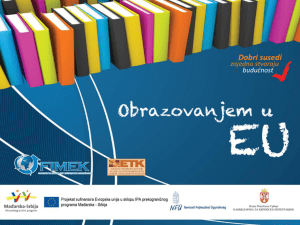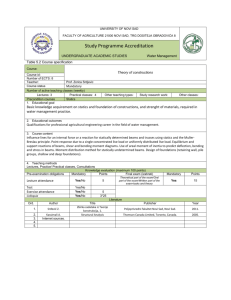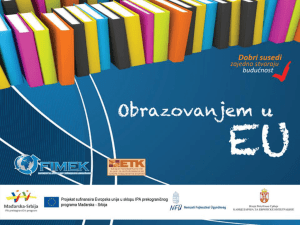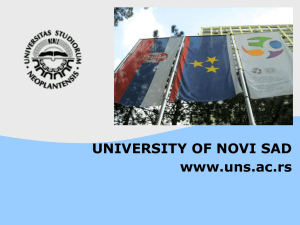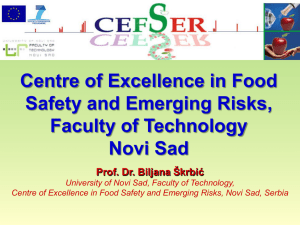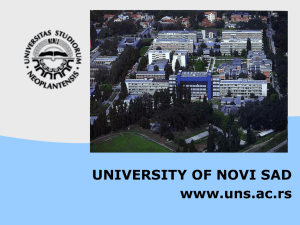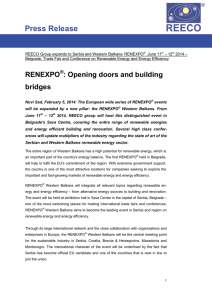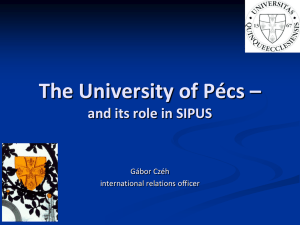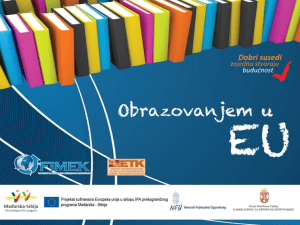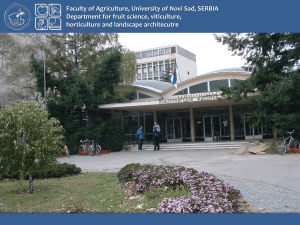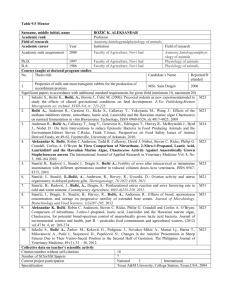Get an impressionUNS
advertisement
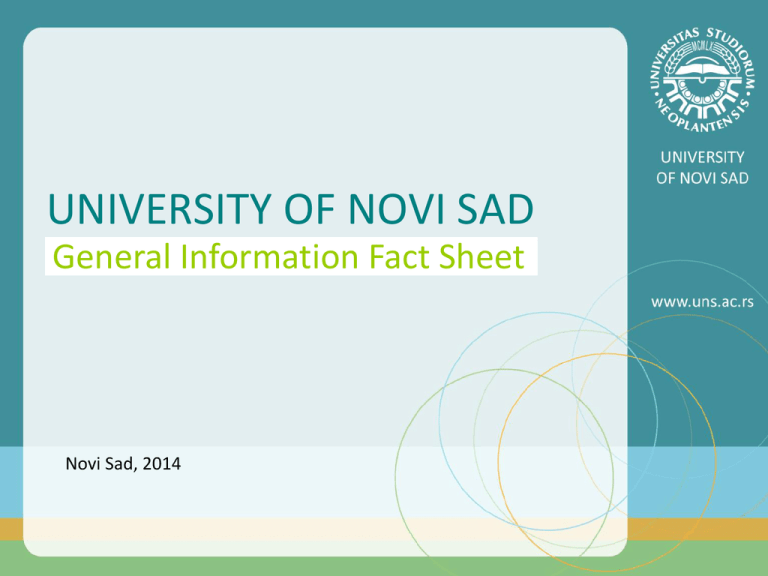
UNIVERSITY OF NOVI SAD General Information Fact Sheet Novi Sad, 2014 UNIVERSITY OF NOVI SAD • Founded in 1960 • Second largest university in Serbia • Comprehensive university - variety of undergraduate & postgraduate study programs • 14 Faculties, 2 R&D Institutes, Association of Centres for Interdisciplinary and Multidisciplinary Studies and Research (ACIMSI), UNESCO Chair for Entrepreneurial Studies, other university centres UNIVERSITY OF NOVI SAD Regional University • University of Novi Sad is the only state university in the Autonomous Province of Vojvodina • UNS comprises faculties located in the 4 cities in AP Vojvodina: NOVI SAD SOMBOR ZRENJANIN SUBOTICA UNIVERSITY CAMPUS IN NOVI SAD • University Campus (259,800 m2) – 7 faculties, student dormitories, teaching assistant dormitory, student health centre, sports fields and facilities, etc. CENTRAL UNIVERSITY BUILDING • New Central University Building in 2013 UNIVERSITY OF NOVI SAD Facts & Figures (academic year 2013/2014) • Students (3 levels of studies) 50,358 • Teaching staff, associates and research staff 3,711 • Non-teaching staff 1,255 • Students enrolled in the first year of bachelor studies in 2013/2014 9,518 • Total number of PhD obtained at UNS (March 2014) 3,854 • Total number of study programmes (3 levels of studies) 359 UNIVERSITY OF NOVI SAD Total number of students at University units FACULTIES AND R&D INSTITUTES Complex & diverse internal structures FACULTIES R&D INSTITUTES • • • • • • • • • • • • • • • Faculty of Agriculture in Novi Sad Faculty of Philosophy in Novi Sad Faculty of Technology in Novi Sad Faculty of Law in Novi Sad Faculty of Medicine in Novi Sad Faculty of Technical Sciences in Novi Sad Faculty of Economics in Subotica Faculty of Sciences in Novi Sad Academy of Arts in Novi Sad Faculty of Sport and Physical Education in Novi Sad Faculty of Civil Engineering in Subotica Technical Faculty “Mihajlo Pupin” in Zrenjanin Faculty of Education in Sombor Teachers’ Training Faculty in Hungarian in Subotica • Institute for Lowland Forestry and Environment Institute for Food Technologies ACIMSI * University Centres for: Sustainable Development and Environment; Medical Physics and Medical Engineering; Meteorology and Environmental Modeling; Sports Management; Techniques and Management in Applied Arts; Gender Studies; Advanced European Studies and Research; Management in Education; Sports Medicine and Physicotherapy; Applied Conflict Transformation Studies. UNESCO Chair for Entrepreneurial Studies UNIVERSITY CENTRES • • University Centre for Applied Statistics University Centre for Educational Development * Association of Centres for Interdisciplinary and Multidisciplinary Studies and Research INTERNATIONALISATION Memberships • • • • • • • • • • EUA – European University Association DRC – Danube Rectors’ Conference IUC – Inter-University Center in Dubrovnik EUF-CE – European University Foundation (Campus Europae) CEEPUS – Central European Exchange Program for University Studies BUN - Balkan Universities Network ACRU - Association of Carpathian Region Universities UniAdrion – Virtual University of the Adriatic-Ionian Basin ALADIN - ALpe ADria INitiative Universities’ Network CASEE-ICA – The ICA Regional Network for Central and South Eastern Europe INTERNATIONALISATION Memberships • STUDENT AND STAFF MOBILITY NETWORKS – Erasmus Mundus Action 2: Basileus V – Erasmus Mundus Action 2: JoinEU-SEE PENTA – Erasmus Mundus Action 2: SIGMA – Erasmus Mundus Action 2: ERAWEB – Campus Europae – CEEPUS – UGrad – Other: DAAD, bilateral arrangements, etc. INTERNATIONALISATION EU Strategy for the Danube Region • EUSDR comprises 4 pillars and 11 priority areas (read more on: www.dunavskastrategija.rs) • The Rector of the UNS Professor Miroslav Veskovic coordinates the Priority Area 7, jointly with the president of the Slovak Academy of Sciences • PA 7: To Develop the Knowledge Society through Research, Education and Information Technologies • This priority is based on a notion that a society’s ability to create and exploit knowledge represents a key factor for progress and growth, recognizing as essential the following targets for the whole Danube Region: o o o o To invest 3% of GDP in Research and Development by 2020; Broadband access for all EU citizens in the Region by 2013; Increase the number of patents obtained in the Region by 50%; Increase the share of the EU population aged 30-34 with tertiary or equivalent education to 40% by 2020. INTERNATIONALISATION Project TRAIN • TRAIN – Training and Research for Academic Newcomers • Initiated and financed by the King Baudouin Foundation in September 2013 • 2-year project • Objectives: to develop, implement and evaluate a structured professional development training program consisting of 7 modules for new academics (PhD students, assistants, junior professors, post-docs of not more than three years work experience). INTERNATIONALISATION Project SIPUS (1) • SIPUS – Strengthening of Internationalisation Policies at Universities in Serbia • With the support from the Tempus programme of the European Union (3-year project; grant applicant: University of Novi Sad) • The qualitative leap in the process of internationalisation • Project's main outcomes: 1. Creating and implementing national legislative that has been lacking to date: Accreditation Standards for Joint and Double degrees, National Strategy of Internationalisation of Higher Education and Research and National Strategy of Academic Mobility and Recognition of Degrees) 2. Creating and implementing individual university strategies on internationalisation and academic mobility along with coherent institutional measures capable of steering internationalisation, improving institutional capacities for the growing participation in international projects and strengthening the process of internal integration of Serbian universities INTERNATIONALISATION Project SIPUS (2) • SIPUS – Strengthening of Internationalisation Policies at Universities in Serbia • Working Packages – WP1: DEVELOPMENT AND ADVANCEMENT OF NATIONAL LEGISLATIVE FOR INTERNATIONALISATION – WP2: ADVANCEMENT OF UNIVERSITY INTEGRATIVE FUNCTION THROUGH INTERNATIONALISATION OF EDUCATION, RESEARCH AND ACADEMIC MOBILITY – WP3: ENHANCEMENT OF INSTITUTIONAL CAPACITIES FOR PARTICIPATION IN LARGE-SCALE INTERNATIONAL COLLABORATIONS TEMPUS IV PROJECTS Selection: March 2013 (1) 1. 2. 3. 4. 5. 6. 7. 8. Strengthening of Internationalisation Policies at Universities in Serbia (SIPUS) Mastering innovation in Serbia through development and implementation of interdisciplinary post-graduate curricula in innovation management (MAIN) Fostering students' entrepreneurship and open innovation in university-industry collaboration (iDEA Lab) Building Network of Remote Labs for strengthening university-secondary vocational schools collaboration (NERELA) Master in Educational Leadership (EdLead) Fostering University Support Services and Procedures for Full Participation in the European Higher Education Area (FUSE) 32 on-going Building capacity of Serbian Agricultural Education to link TEMPUS with Society (CaSa) projects at Restructuring of doctoral studies in Serbia (RODOS) UNS TEMPUS IV PROJECTS Selection: March 2013 (2) 9. 10. 11. 12. 13. Development of higher education and society by creating a collaborative environment in the field of arts and media through regional student partnership in production of audio/video content (StudAVP) Serbia: Striving towards excellence in Veterinary Education (EDUVET) Sport Professions - Education, Employment, Development in the Balkan Region (SPEED) International Joint Master Programme on Material and Energy Flows Management (MEM) Strengthening Higher Education for Social Policy making and Social Services delivery (SHESPSS) 32 on-going TEMPUS projects at UNS FP7 PROJECTS Selection 2013 1. Earth Observation for Economic Empowerment (EOPOWER) Low-cost and energy-efficient LTCC sensor/IR-UWB transceiver solutions for sustainable healthy environment (SENSEIVER) 2. Fostering sustainability and uptake of research results through Networking activities in Black Sea & Mediterranean areas (IASON) 3. DANube Macroregion: Capacity Building nd Excellence in River Systems (basin, delta and sea) (DANCERS) 5 on-going FP7 projects at UNS LLP PROJECTS Selection 2013 The Jean Monnet programme • Stimulating teaching, research and reflection in the field of European integration studies at the level of higher education institutions within and outside the European Community • New project in 2013: REGIONALISING EUROPE: Regional Development as a Modality of European Integratio SCIENCE AND RESEARCH Projects and Conferences • In 2012, 571 different on-going science and research projects, knowledge transfer projects, international research, student mobility and other projects at UNS • About 45% of all science and research projects at UNS funded by the Ministry of Education and Science of the Republic of Serbia • About 16% of all science and research projects at UNS funded by the Provincial Secretary for Science and Technological Development of the Autonomous Province of Vojvodina • About 120 science and other conferences and symposiums organized by the UNS faculties and R&D institutes annually SCIENCE AND RESEARCH Basic Scientific Facts & Figures * Activity Number On-going international projects COST (34), TEMPUS (20), FP7 (19), Multilateral (17), IPA (15), CEEPUS (11), EUREKA (5), NATO (2), CIP (1) Peer-reviewed 845 + 150 journal papers (ISI (without UNS affiliation) ranked) (in 2012) Patents (in 2012) 54 * Source: Catalogue of research and innovation potential of the University of Novi Sad, 2013; TEMPUS Project “Modernization of WBC universities through strengthening of structures and services for knowledge transfer, research and innovation – WBCInno (530213-TEMPUS-1-2012-1RS-TEMPUS-JPHES). UNIVERSITY RESEARCH AND INNOVATION POTENTIAL • UNS is recognized in this part of Europe as the coordinator of significant projects, dedicated to innovation and technology transfer and ideas commercialization, financed through programmes of the European Commission. • 3 university units established at the University level: – Innovation Center, – Technology Transfer Center and – Novi Sad Incubation Center (first phase of the construction of the Science Technology Park). INNOVATION POTENTIAL Centers, Laboratories and Research Groups (1) • • • • • • • • • • • • • AlfaNum BioSense Centre Chemical Technology and Environmental Protection Group Centre for Identification Technologies – CIT Centre for Integrated Microsystems and Components Centre for Mathematics and Statistics Centre for New Materials/Chair of Experimental Physics of Condensed Matter Centre for Renewable Energy Sources and Power Quality – CRESPQ Chair for metrology, quality, fixtures, tools and ecological engineering aspects Department of Applied Mechanics FP7 Centre of Excellence in Food Safety and Emerging Risks Group for Artificial EM Materials and Microwave Engineering Group for Systems Analysis and Decision Making INNOVATION POTENTIAL Centers, Laboratories and Research Groups (2) • • • • • • • • • • Humanoid Robotic Group - HRG Institute for Lowland Forestry and Environment - ILFE Laboratory for Advanced Materials Laboratory for Intelligent Control and Biomedical Engineering Laboratory for investigation of natural resources of biologically and pharmacologically active compounds Laboratory for Nano and Printed Electronics Laboratory for the study of xenobiotics in biological systems Loess and Geoheritage Research Group The Novi Sad Nuclear Physics Group Reproductive Endocrinology and Signaling research group - RES group CONTACT UNIVERSITY OF NOVI SAD Dr Zorana Djindjica 1 21000 Novi Sad, Republic of Serbia rektorat@uns.ac.rs www.uns.ac.rs
